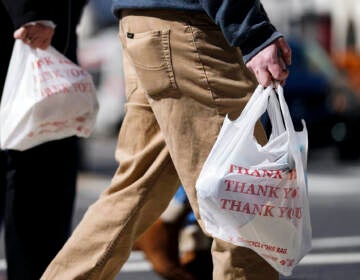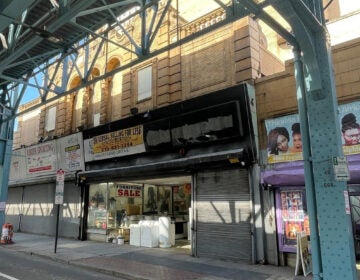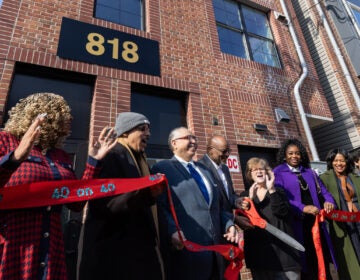Parker promises change on litter and dumping in Philly. What will that take?
Advocates are encouraged by the new mayor’s early plans to clean up the city. But some are skeptical about her pick to lead the efforts.
Listen 1:08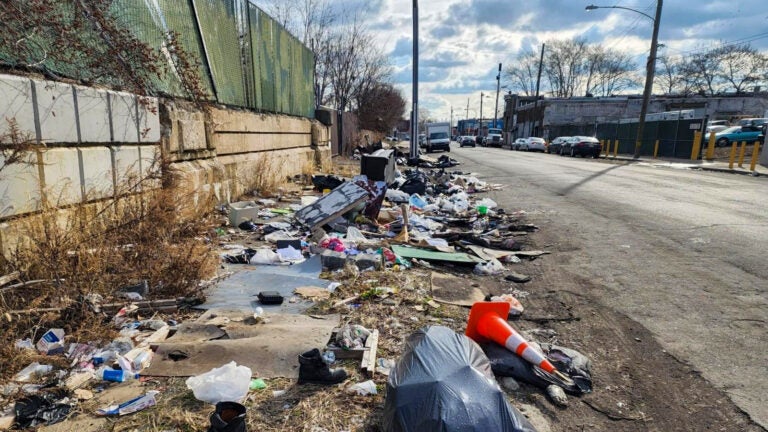
Dumping at Fairhill and Annsbury streets in North Philadelphia, as reported to Philly 311 on March 8, 2022. (Twitter/@PHILLY311PHOTOS)
This story is part of the WHYY News Climate Desk, bringing you news and solutions for our changing region.
From the Poconos to the Jersey Shore to the mouth of the Delaware Bay, what do you want to know about climate change? What would you like us to cover? Get in touch.
Will Mayor Cherelle Parker really make Philadelphia the “cleanest, greenest big city in the nation,” as she’s vowed countless times over the past year? Or at least make it noticeably cleaner and greener than it is now?
Community activists and local experts say they fervently hope so, given the illegal dumping and litter that plague many neighborhoods, as well as historically low recycling rates and persistent problems with abandoned vehicles, blighted lots, potholes, and graffiti.
They say they’re encouraged by the prominence she’s given these issues — “Clean and Green” is the second priority in her 100-Day Action Plan, after public safety. They’re also pleased to see her emphasize collaboration with community groups and businesses, and promise to use data to track the success of the city’s efforts.
“I’m really glad that the mayor has put this back on the agenda after [Mayor] Kenney took it off,” said Maurice Sampson, a Parker transition team member who started the city’s recycling program in the 1980s and serves on the Solid Waste and Recycling Advisory Committee.
But some said they were deeply disappointed when Parker announced that Kenney’s Streets Commissioner Carlton Williams would head her new Office of Clean and Green Initiatives, given the Streets Department’s inability to handle the trash problem during his tenure.
“I am totally dismayed that Carlton Williams has been at the head of anything,” said Aminata Sandra Calhoun, a West Philly resident who leads cleanups through the Centennial Parkside CDC. “If he was the person [to lead], we would not be seeing today — in 2024 — what we are seeing. It is horrendous in socially, economically challenged communities. These are the communities that I’m cleaning Monday through Friday, and it hasn’t reduced.”
Others are more sanguine, saying that Williams is not to blame for the prior administration’s passivity, his department’s finite resources, the city’s outdated waste management systems, the effects of the pandemic and other challenges.
Williams and his eventual successor at the Streets Department may be able to make a real impact, they say — if the mayor demands it and provides them with the support they will need.
The city declined to make Williams available for an interview or provide comment for this article.
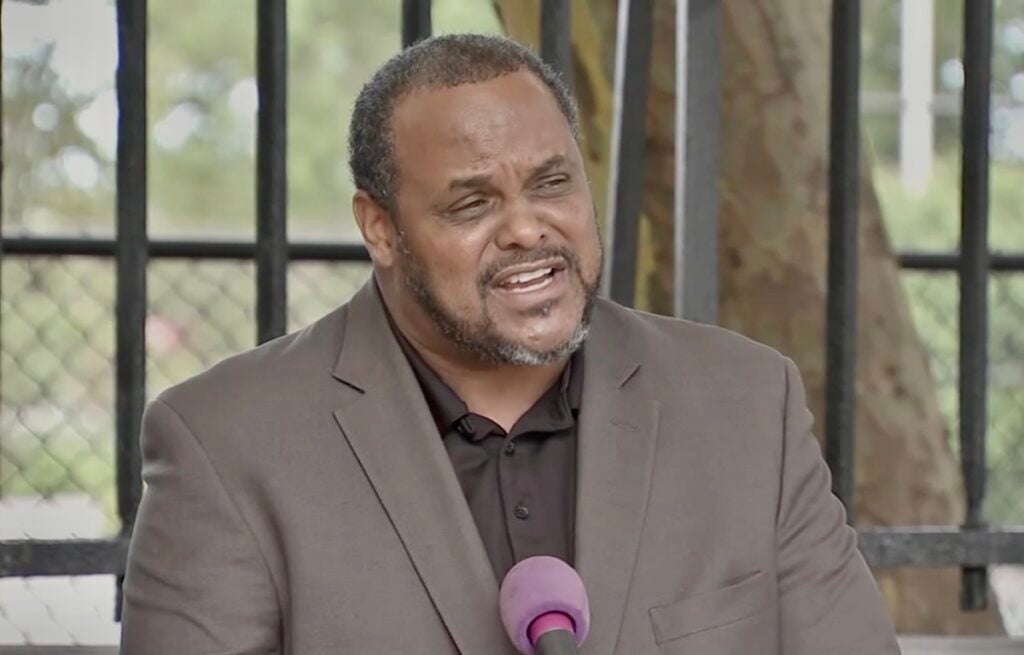
An early phenom, then the “wrong job”
Williams has spent most of his career with the city, working initially for the Fairmount Park Commission, the Recreation Department and then Streets. As a deputy commissioner, he oversaw trash collection, expanded recycling programs, helped introduce BigBelly street receptacles, and started the annual Philly Spring Cleanup.
“I don’t have many like Carlton,” then-deputy mayor Rina Cutler gushed in 2012, when Williams won the first-ever Richardson Dilworth Award for Distinguished Public Service. “He goes so well beyond what people’s expectations are… It’s phenomenal to watch him in action.”
In 2012, Mayor Michael Nutter appointed Williams commissioner of Licenses and Inspections, which oversees building code enforcement, despite his lack of experience with construction. The following year, the city saw one of its worst construction disasters in recent history, when a Market Street building being demolished fell onto a Salvation Army thrift store next door, killing six people and injuring 14 others.
L&I came under intense scrutiny for not doing more to monitor demolitions and prevent accidents. Reports of botched or missing building inspections accumulated over the next two years, and City Controller Alan Butkovitz called for Williams’ dismissal.
When Jim Kenney was elected mayor, he returned Williams to Streets, saying he was a “good man” who had been put in the wrong job. The following year, the top job opened up, and Williams became Streets Commissioner.
Then, as now, dumping and litter were among residents’ top complaints. Under Kenney, Streets and other departments tried to modernize their trash-fighting efforts.
The city created a Zero Waste and Litter Cabinet to coordinate inter-agency efforts on recycling, enforcement, and education, with the goal of no longer sending trash to landfills or incinerators by 2035. It published a block-by-block litter index to identify those that needed attention, started a street sweeping pilot, installed more surveillance cameras, and coordinated with police and prosecutors to crack down on illegal dumpers.
“We can partner together to solve an age-old problem that we’ve been trying to solve for decades,” Williams said in 2017, referring to litter. “Together and holistically, we can use multiple agencies — it’s not just the Street Department, it’s not just CLIP [the Community Life Improvement Program], it’s not just Licenses and Inspections — but it’s the entire city government working with residents.”
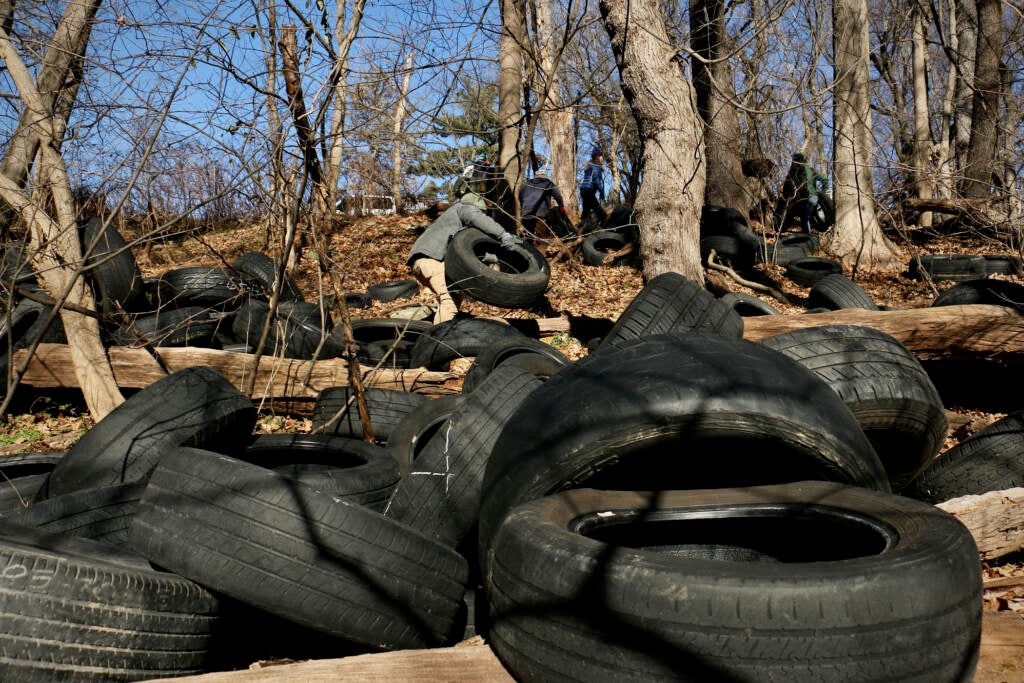
A mistake or a new start?
But the renewed effort didn’t last long. In spring 2020, the pandemic hit and Philadelphia’s waste management systems buckled.
That summer, the combination of homebound families generating much more residential trash, poor weather, sanitation workers out sick with COVID, and understaffing led to delays in curbside pickup, mounds of trash piling up on sidewalks, the mixing of recyclables with regular trash, and a spike in 311 calls.
The city rolled out a small, permanent street sweeping program the following year. Still, Streets continued struggling to pick up trash reliably due to high rates of injuries and absenteeism among its overworked sanitation crews. Kenney shut down the litter cabinet and dismissed its director, citing budget pressures. Complaints about graffiti climbed. Police investigations of illegal dumping plummeted, and city data suggested that dumping volumes jumped after previously decreasing for several years.
While Philadelphia’s trash struggles are nothing new, the crisis of the last few years has left some community members who focus on waste issues with little faith that Williams is the person who can turn things around.
“We are concerned about Carlton Williams because, under Mayor Kenney, we saw an astonishing reduction in recycling from 21% to 8%,” said Shari Hersh, founder of the Trash Academy environmental justice collective. “We saw a return to nearly the same levels of dumping as 2016, after a 40% reduction between 2016 and the end of 2019. There’s some concerns, and we’re hopeful that this mayor has a different approach.”
In 2021, a group of activists was so appalled about the state of trash collection they held a protest on the steps of the Municipal Services Building, standing next to bags of waste they’d collected and holding signs. They called for Williams’ resignation, better trash pickup strategies, and improved working conditions for sanitation crews.
They included Nic Esposito, the former director of the Zero Waste and Litter Cabinet before Kenney eliminated the position in 2020. He notes that litter and illegal dumping, as measured by the volume of Streets Department cleanups, fell from over 10,000 tons in 2016 to over 6,000 tons in 2019, but was back up to over 8,000 tons in 2022. He says recycling never recovered from the pandemic, as it has in other cities.
He says it’s “ridiculous” that it took the city five years into Kenney’s administration to roll out street sweeping, and says Williams bungled other programs like Philacan, an effort to distribute lidded trashcans that never expanded beyond a small section of North Philly.
Parker’s decision to put Williams in the Clean and Green office “was a mistake,” said Esposito, who is now with the sustainability nonprofit Circular Philadelphia. “There’s all these things that, over and over and over again, have not showed results. He was the commissioner of a major department, the buck stops with him, and he was not able to succeed.”
Yet others said they were willing to give him a chance in the new position. They include Terrill Haigler, the former sanitation worker-turned-trash activist known as Ya Fav Trashman, who protested along with Esposito and called for Williams’ dismissal. He said he’s noticed a dropoff in illegal dumping recently, has seen the new street sweeping program in action and is looking forward to genuine innovation from the new administration.
Williams is “in his new role — it’s new to everybody, including the city — so we’ll see how that unfolds,” Haigler said. “And we’ll see who becomes Streets Commissioner.”
Teea Tynes, a resident of North Philly’s Fairhill neighborhood who helps lead Trash Academy and is part of HACE’s Neighborhood Advisory Subcommittee, said she doesn’t know Williams personally but has heard positive things.
“I hear that he’s a pretty affable guy,” she said. “I am going to be hopeful about him and what he can do about this current situation with litter, waste, and dumping. We can only help and try to push people in that direction.”
Sampson, the former recycling director, had harsh words for what he described as Kenney’s lack of direction for the Streets Department in his second term, but said it would be a mistake to lay all the blame for its failures on Williams.
“I’ve known Carlton since the beginning of his career. He works very hard. He tries to do the job. He never complains. He’s very dedicated to public service,” Sampson said. At the Streets Department, “whatever the mayor wants is what they do. When we focus on blaming the Streets Department, or Carlton Williams, we’re letting the mayor’s office off the hook.”
New mayor, new trash plan
Making Philadelphia “clean, green, and resilient” is one of the top priorities in Parker’s 100-day plan, released early this month.
Her administration promises to undertake three waste-related initiatives within her first 100 days: announce a “new approach” to tackling quality-of-life issues like potholes, litter, and illegal dumping; announce an expansion of the Taking Care of Business program, which pays community-based nonprofits to clean commercial corridors; and convene a “Clean and Green Cabinet” involving city agencies, community partners, and businesses.
Several advocates were pleased to see the emphasis on fighting litter and dumping — and eager to learn more details as the administration’s plans develop.
“I’m really glad she’s prioritizing it,” said Hersh, a leader of Trash Academy.
Nicole Brunet, policy director with the Bicycle Coalition of Greater Philadelphia, said she’s waiting to see how Clean and Green shows up in Parker’s first budget proposal this spring. She’ll be watching the allocation for street paving, which she says has been insufficient to meet the Streets Department’s annual goal of 131 miles of paving in recent years. During last year’s paving season, the Streets Department resurfaced just 55 miles of roadway.
“When you think about potholes, when you think about outdated line striping, and especially now that we’ve actually had snow, we’ll have some more deterioration of our roads,” Brunet said. “It’s definitely a big quality-of-life issue.”
Parker spearheaded legislation creating the Taking Care of Business program while on City Council in 2019. It now funds regular cleanups by community nonprofits in 83 commercial corridors throughout the city, including Woodland Avenue in Southwest Philly, Lancaster Avenue in West Philly, Kensington and Allegheny Avenues in Kensington, and several sections of Broad Street.
In 2022, the program collected more than 12,000 dumpsters worth of trash — less than the previous year, which the Department of Commerce took to mean cleaning the corridors has helped prevent litter and dumping. During her campaign for mayor, Parker promised to “put that program on steroids.” Her 100-day plan indicates the expansion will cover more corridors, fund more frequent cleanings and enroll more nonprofit partners.
Calhoun, whose cleanup program at Centennial Parkside CDC is funded through Taking Care of Business, found Parker’s 100-day plan lacking in details about what the expansion will consist of. She wants to see the program fund more workers, longer hours, higher wages — which are currently $15 an hour — and larger cleanup territories.
“Don’t just give me some superficial words on paper,” Calhoun said. “Expand how?”
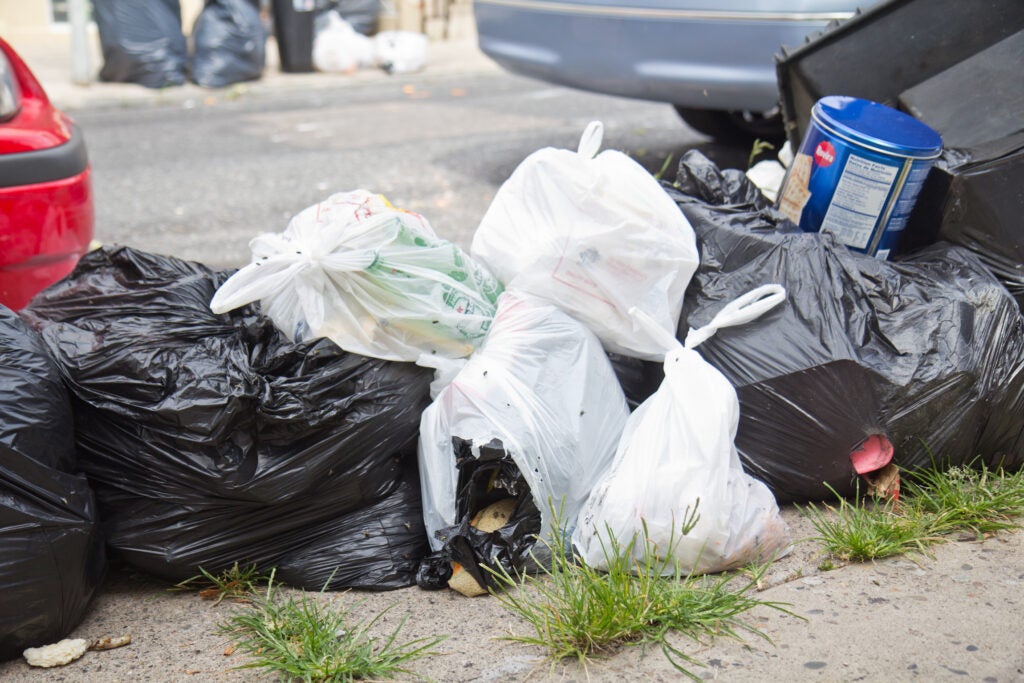
More than just cleaning up
Several advocates see Parker’s planned Clean and Green Cabinet as a reimagining of the slashed Zero Waste and Litter Cabinet — which they want to see restored — under a different name.
Her platform calls for a “data-driven action plan” to reduce waste generation and increase recycling rates. The old cabinet had a similar goal of reducing the amount of waste heading to landfills, trash incinerators and city streets.
The new cabinet would reflect calls from advocates to focus not just on cleaning up litter and dumping, but also on preventing it from hitting the streets in the first place.
“You can’t clean your way out of it,” Hersh said. “All that cleaning [under Kenney] and those huge investments in cleaning did not solve the problem. So hearing her talk about waste reduction … It’s extremely good that she’s prioritizing these things.”
Part of the goal should be to send the message that illegal dumping will not be tolerated, said Esposito, the former head of the Zero Waste and Litter Cabinet.
“It’s not just about putting cameras up,” he said. “You need to have what we were doing — a city-wide enforcement strategy that hits on the law department, the police, the DA’s office, the different departments, everyone working together to really monitor these sites and catch people.”
Hersh wants to see the new administration recommit to publishing transparent data about the prevalence of litter and illegal dumping in the city. The city’s last litter index report was published in 2019. Parker’s plan says her administration will use a “public ticker” to show progress on quality-of-life issues.
The Clean and Green Cabinet is also charged with bringing the government together with businesses and community partners, and addressing appeals from grassroots neighborhood cleanup groups to be brought into the city’s strategy.
“You already have people like me doing the unpaid labor of cleaning up,” Tynes said. “So get their thoughts, tap into their energy and put them to work.”
Oskar Castro, a resident of Southwest Philly who frequently sees debris dumped illegally near his home, hopes the school district will be one of the community partners the Parker administration works with. He sees education as key to preventing litter and dumping long term.
“Maybe all of us adults are too far gone. We’re going to be litterers. We’re going to be dumpers,” Castro said. “But can we work on the young people?”
He also wants to see a stronger emphasis on enforcement of laws against illegal dumping, including better collaboration between the police department and other parts of city government fighting dumping.
“I didn’t notice [in Parker’s plan] that there was that level of inclusivity, and really being able to utilize the people who are already on the ground in these neighborhoods,” he said.
Sampson, the former city recycling program administrator, said Parker has set the bar higher on waste-related issues than other mayors before her.
“Let’s give her the support she needs coming out of the chute,” he said. “It’s going to be a whole city effort, and we’ll just see if the departments that she manages respond to her message.”
Editor’s note: Mayor Cherelle Parker’s transition team includes John Salveson of the Salveson Leadership Advisors, LLC, which has been retained to help oversee recruiting staff for the administration. Salveson is also chairman of WHYY’s board of directors.

Get daily updates from WHYY News!
WHYY is your source for fact-based, in-depth journalism and information. As a nonprofit organization, we rely on financial support from readers like you. Please give today.




